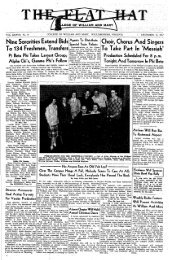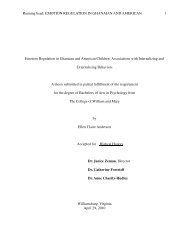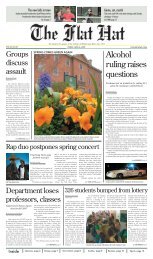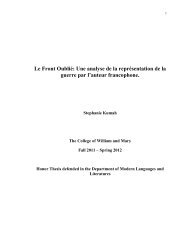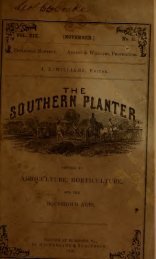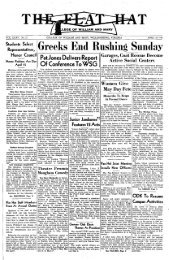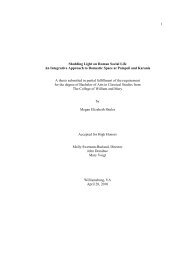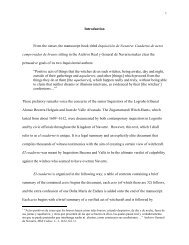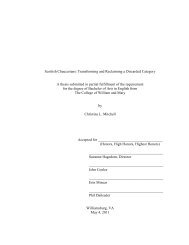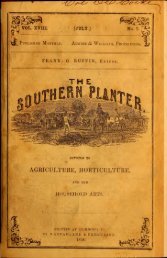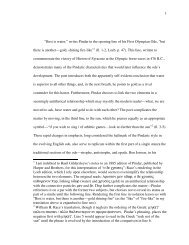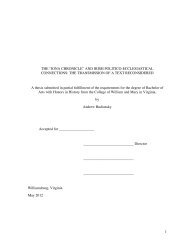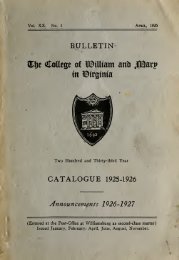Southern planter - The W&M Digital Archive
Southern planter - The W&M Digital Archive
Southern planter - The W&M Digital Archive
You also want an ePaper? Increase the reach of your titles
YUMPU automatically turns print PDFs into web optimized ePapers that Google loves.
1859.] THE SOUTHERN PLANTER. 421<br />
every true patriot should fervently pray that<br />
they might last and endure forever<br />
'Our union of lakes and union of lands,<br />
Our union of States, none shall sever,<br />
Our union of hearts and union of hands,<br />
And the Flag of our Union forever."<br />
Wearing out Land.<br />
" Our land does not produce two-thirds as<br />
much now as it did fifteen years ago."<br />
So writes a fanner from a region which<br />
san not have been settled more than from<br />
twenty to thirty years.<br />
Our reflection is, that the farmers there<br />
cannot be worth more than two-thirds as<br />
much as they would have been if they had<br />
>o managed their lands as to increase in-<br />
stead of diminishing its productiveness.<br />
<strong>The</strong>re may be exceptions—some men<br />
may be keen enough to make money and<br />
year out their land by the same operation.<br />
But the general rule is the reverse of this<br />
—that, the most profitable husbandry im-<br />
3roves the land, and that the husbandry<br />
vhich deteriorates the land is not profita-<br />
)le. We hold that a farmer of only orlinary<br />
means cannot afford to make his own<br />
and poorer ;<br />
and that even if he were culivating<br />
another man's land for a succession<br />
)f years, he could not possibly afford to<br />
eave it much worse than he found it.<br />
American Farmers' Magazine.<br />
LESS LAND OR MORE LABOUR—WHICH ?<br />
We are not one of those who indiscriminately<br />
recommend small farms. We fear<br />
here is a tendency in small farms to make<br />
mall men; and we deprecate the idea that<br />
he farmer is to be a man to be looked<br />
lown upon by men in other callings. <strong>The</strong>re<br />
las been enough of that in the history of<br />
his world, and we want to see the tables<br />
urned. Nevertheless it would be better to<br />
jet a good living from ten acres than to<br />
ail of a living from a hundred.<br />
In another place we have intimated that<br />
t is cheaper to make land more productive<br />
han to wear it out, as the phrase is; that<br />
f we enrich the land, it enriches us ; and<br />
hat if we impoverish it, it impoverishes<br />
is. Something like a demonstration of<br />
his would gratify some of our readers,<br />
rhis we will attempt ; and what we have to<br />
iay shall be in close connection with our<br />
notto, Less land or more labour.<br />
That it is cheaper to raise a farm to a<br />
higher than to sink to a lower productiveness<br />
is our proposition ; and what wo mean<br />
by it is, not that it costs more labour to diminish<br />
than to increase the productive<br />
power of the soil, but that it does require<br />
more unpaid labour to wear out a soil by a<br />
ten years' cultivation than to enhance its<br />
productiveness in the same time.<br />
To simplify as much as may be, we will<br />
suppose here are three acres, arable land,<br />
now in turf, and of a fair quality, to be<br />
cultivated respectively by' A, B, and C, for<br />
the next ten years. A is a calculating,<br />
thinking farmer, in no way extravagant,<br />
but willing to expend money and labour<br />
where he sees a reasonable prospect of a return<br />
with profit. B is a careful soul, wil-<br />
ling to labour, but as shy of all other ex-<br />
penses for crops as of the itch. C takes it<br />
easy, and will reap what his land will give,<br />
without giving it back much of either labour<br />
or manure.<br />
Indian corn, we will suppose, to be the<br />
crop the first year. A turns over the turf<br />
in November to a good depth ; harrows in<br />
fifty loads of compost in the spring, made,<br />
it may be, of twenty loads of barn manure<br />
and thirty loads of something which<br />
his industry and integrity have gathered<br />
up at a cheap rate for the purpose ; plants<br />
the best variety of corn that he can get<br />
any certain knowledge of, about the middle<br />
of March ; tends the crop well, and gets<br />
eighty bushels to the acre.<br />
B wants all his manure for other crops,<br />
and thinks tho turf land will do pretty<br />
well without manure. He plows in March,<br />
five or six inches deep, but very nicely.<br />
His team is not strong enough to plow much<br />
deeper ; and as for paying for extra team<br />
work and manure to warm the deep soil<br />
that would be plowed up, he cannot think<br />
of it. Farming, in his opinion, is not a<br />
business to spend money in, but to get<br />
money by. But he plants in good season,<br />
tends the corn well all summer, and gets<br />
thirty bushels.<br />
C takes it easy; plows when it is most<br />
convenient; plants and hoes when nothing<br />
hinders; does the work shabbily, according<br />
to his wont ; and more by providential fa-<br />
vour, than by his skill or industry, gets six-<br />
teen bushels of decent corn and plenty of<br />
pig ears.<br />
Now B has done more work than C ; A<br />
has expended more labour than either, be-



